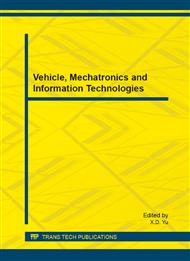p.421
p.425
p.430
p.435
p.441
p.446
p.450
p.455
p.459
Sliding Adaptive Control of a Chinese Medicine Sugar Precipitation Process
Abstract:
A dynamic model dedicated to Chinese medicine sugar precipitation was designed, without consideration of crystal size distribution. A batch crystallizer was extended for studying the crystallization kinetics. Sliding mode adaptive control algorithm was proposed for the uncertain nonlinear systems. The scheme is robust for the uncertainties and overcomes the chattering in the input of sliding mode control in presence of disturbances and modeling error. It was applied to the precipitation control of sucrose-glucose mixed solution, and the validity of the proposed algorithm was supported by simulation results.
Info:
Periodical:
Pages:
441-445
Citation:
Online since:
August 2013
Authors:
Price:
Сopyright:
© 2013 Trans Tech Publications Ltd. All Rights Reserved
Share:
Citation:


